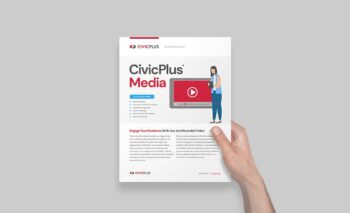Ultimate Guide to Virtual Government Meetings
Virtual government meetings are no longer just an option reserved for emergencies. They’re an expectation and, in many cases, a legal obligation.
Why Host Virtual Government Meetings?
Hosting accessible meetings is an essential part of maintaining a transparent relationship with your residents. Here are a few more benefits of video conferencing for governments.
- Improved Inclusivity and Accessibility: By eliminating attendance barriers, virtual meetings encourage participation from a diverse group of residents who may not otherwise be able to join—including residents with limited mobility and childcare responsibilities.
- Enhanced Transparency: Accessible virtual meetings offer residents new insights into how their governments function and new opportunities to take part in government proceedings. Ultimately, they boost public trust by demonstrating government self-expectation of accountability.
- Reduced Carbon Footprint: Virtual meetings mean fewer cars on the road and fewer paper agendas to print. That means taking meetings online can have a significant impact on your agency’s emissions and waste generation.
- It’s the Law: Depending on your state’s laws, hosting virtual meetings may be more than a best practice. In Indiana, for example, the Open Door Law has permitted residents to access meetings held by public agencies since it was passed in 1977.
What You Need to Host Virtual Government Meetings
This is the minimal equipment required for successful virtual government meetings:
- Web cameras
- Speakers or audio equipment
- A display screen
- A high-speed internet connection
- Microphones
- Video conferencing software
- A searchable library of meeting recordings
Virtual Government Meetings: Best Practices
While there are obvious benefits to virtual meetings and video calls, it’s important to approach them strategically. Here are some best practices to consider.
Select the Right Technology
Platforms like Zoom aren’t sufficient to meet the video-conferencing needs of governments and public agencies. Public servants require purpose-built platforms with features for engaging the public and meeting requirements for accessibility. Factors to consider when assessing potential platforms include:
- Ease of Navigation: Select an intuitive tool that’s easy for your staff and residents to use. Look for tools with clear user interfaces including large icons, text labels, clear color contrasts, and volume control to comply with the ADA’s regulations and meet WCAG 2.2 standards.
- Compatibility with Assistive Technology: Residents with disabilities may regularly use tools like screen readers or voice-activated software to help them navigate the Internet.
- Security: Online video conferencing can boost engagement and resident satisfaction, but it can also open the door to cybercriminals. Choose a software solution with robust security features like password protection and private meeting links.
- Integrations: An integrated tech stack improves efficiency and streamlines operations. You may, for example, choose a video conferencing platform that works alongside your agenda and meeting management solution or tools for social media archiving.
- Scalability: Your government’s technology needs may change as your community grows and resident expectations evolve. It’s crucial to select a solution that’s capable of scaling with your agency.
- Customer Support: No matter what solution you pick for hosting your virtual government meetings, you’ll undoubtedly have some questions. Make sure to select a provider who’s known for offering dedicated support.
Test Your Tech Ahead of Time
Before you host your first virtual government meeting, make sure you understand your video conferencing software thoroughly. Always arrive to meetings early to troubleshoot and proactively address any issues that might affect the quality of your presentation or discourage participation.
Prioritize Audio and Lighting
A well-executed virtual meeting can be just as professional and efficient as an in-person session. Ensure a high-quality presentation by placing participants in a well-lit room. Light sources should come from the front to avoid casting faces in shadows, and cameras should remain at eye-level. Encourage participants to use wired headphones to avoid connectivity issues.
Stay Transparent
Keep residents informed with timely updates. If there’s a delay due to technical difficulties or a change to your agenda, make sure you share this information to foster trust and stay productive.
Engage with Residents
Most video conferencing technologies allow the host to mute and unmute participants. Muting all participants upon arrival will keep the focus on your speaker and eliminate background noise. You may consider asking residents to sign up in advance if they’re interested in participating during the meeting. In these instances, password protection can help keep meetings on track by ensuring only registered attendees can participate.
Record and Archive Your Meetings
Promote transparency and build public trust by recording your meetings and storing them for on-demand access. A centralized, searchable archive will allow your residents to watch past sessions and keep themselves informed.
Solicit Internal and Resident Feedback
Building a culture of continuous improvements starts with listening. After your virtual meetings, gather feedback from both staff and residents to determine what’s working well and where there is room for growth. Use surveys and comment forms to ask attendees about accessibility, audio and video quality, and the overall experience.
Why You Should Upgrade Your Video Conferencing Capabilities Now
According to the Centers for Disease Control and Prevention, more than 28% of people in the United States have a disability. Every agency has a responsibility to ensure all individuals can equally participate in government business.
By embracing virtual meeting software and opening your meetings to remote teams and participants, you’ll boost accessibility and transparency and improve the civic experience for every member of your community.
Virtual meetings also help agencies maintain compliance with accessibility laws, which are always evolving.
In April 2024, the U.S. Department of Justice issued a new rule pertaining to Title II of the Americans with Disabilities Act (ADA), mandating “the adoption of specific technical standards for making accessible the services, programs, and activities offered by state and local government entities to the public through the web and mobile applications.”
For state and local governments with a total population of 50,000 or more, the compliance deadline is April 24, 2026, and entities with a total population of fewer than 50,000 must meet a compliance deadline of April 26, 2027.
Start making strides now to ensure that you’re doing all you can to get each and every resident involved through in-person or remote collaboration. At the same time, you’ll reduce the administrative burden on your staff, boosting productivity and morale.
CivicPlus Agenda and Meeting Management and CivicPlus Media
As you can see, digitized agenda and meeting management isn’t just important for maintaining accessibility and transparency. In many states, it’s tied to compliance mandates and laws around public access to information. CivicPlus® Agenda and Meeting Management integrates seamlessly with CivicPlus® Media to help your staff engage residents with live and recorded video. Users have seen dependable benefits including:
- Reduced agenda, packet, and minutes prep time: Automated processes save agencies all over the country countless hours by eliminating manual work. Zach Beck, a City Clerk in Escondido, California, reports that his team has “reduced [their] agenda preparation time by 40-50%.” Sarah Brake, a Deputy Clerk and Technology Implementation Specialist from Hillsborough Township in New Jersey, says, “I can’t tell you how much time we’ve saved preparing the minutes because [Agenda and Meeting Management] compiles them for us.”
- Simplified agenda and minutes creation: Thanks to pre-populated templates and centralized document management, users save considerable time and frustration. Residents gain access to an accessible online library of agendas, voting results, and more.
- Improved transparency and accountability: Offering access to public records promotes a transparent relationship with the public and version history tracking simplifies internal audits.
For more information on the benefits of CivicPlus Media, our live streaming and recorded video technology solution, download the fact sheet. To learn more about transforming public meetings, take a self-guided tour of our Agenda and Meeting Management solution.


